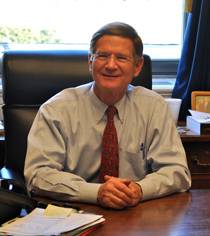FIRST Act Prioritizes Science Investments to Keep America First
 As Chairman of the Science, Space, and Technology Committee, I introduced the Frontiers in Innovation, Research, Science, and Technology (FIRST) Act (H.R. 4186). The bill reauthorizes and streamlines federal investments at the National Science Foundation (NSF) and the National Institute of Standards and Technology (NIST) by funding research and development (R&D) to address national needs. The bill highlights manufacturing competitiveness as the primary role of NIST’s Manufacturing Extension Partnership (MEP) while providing greater flexibility to MEP centers. It also sets priorities for taxpayer-funded research and drives our nation’s investments in science, technology, engineering and math (STEM) education programs.
As Chairman of the Science, Space, and Technology Committee, I introduced the Frontiers in Innovation, Research, Science, and Technology (FIRST) Act (H.R. 4186). The bill reauthorizes and streamlines federal investments at the National Science Foundation (NSF) and the National Institute of Standards and Technology (NIST) by funding research and development (R&D) to address national needs. The bill highlights manufacturing competitiveness as the primary role of NIST’s Manufacturing Extension Partnership (MEP) while providing greater flexibility to MEP centers. It also sets priorities for taxpayer-funded research and drives our nation’s investments in science, technology, engineering and math (STEM) education programs.
The FIRST Act broadens the definition of STEM education to include academic subjects like computer science that build on traditional STEM subjects. The bill also includes language allowing NSF to support student participation in nonprofit competitions, out-of-school activities and field experiences related to STEM. The legislation also encourages outcome-based evaluations of STEM programs.
To remain globally competitive, we need to make sure our priorities are funded and that taxpayer dollars are spent wisely. The FIRST Act funds innovative science and STEM education programs at NSF. A well-educated and trained STEM workforce will promote our future economic prosperity. But we must persuade our nation’s youth to study science and engineering so they will want to pursue these careers. The FIRST Act encourages NSF to support out of the box learning experiences that will inspire our future scientists and engineers. Unless we act swiftly, American researchers will continue to fall behind in supercomputing and particle physics. And we risk losing our lead in nano-technology, the health sciences, aerospace, lasers and other crucial areas. To reverse this trend, the FIRST Act increases investments for basic research in critical areas such as biology, chemistry, physics, computer science, engineering and mathematics. Advances in these fields drive innovation, create jobs and keep our economy strong.
Unfortunately, NSF has misused taxpayer dollars and funded too many questionable research grants - money that could have gone to higher priorities. For example, how does the federal government justify spending over $220,000 to study animal photos in National Geographic? Or $50,000 to study lawsuits in Peru from 1600 - 1700? We all believe in academic freedom for scientists, but federal research agencies have an obligation to explain to American taxpayers why their money is being used on such research instead of on higher priorities. In a time of constrained federal spending, the FIRST Act protects NSF’s budget in order to keep America on the cutting edge of science.
Last year, the President’s Science Advisor testified that there is “room for improvement” in how the NSF prioritizes research initiatives based on potential value to the national interest. The National Science Foundation spends nearly $7 billion every year. Under the FIRST Act, NSF will be held accountable for grants it awards taxpayer dollars. The bill requires that NSF provide clear justifications for why grants that receive taxpayer dollars are in the national interest. The FIRST Act does not change NSF’s peer review process. It expands accountability and transparency requirements so that only high quality research receives taxpayer funds.
The U.S. still leads the world in R&D spending. But despite the U.S. government’s spending more on R&D than any other country, American pre-eminence in several science and technology fields is slipping. Experts have projected the U.S. will fall behind China in R&D spending in about ten years. The FIRST Act encourages federal science agencies to use innovative funding models for research, such as prize competitions and crowd-sourcing, to solve big problems. It also strengthens advanced manufacturing R&D partnerships among universities, national laboratories and businesses.




Comments
Join the discussion on Facebook
Join the discussion on Facebook.